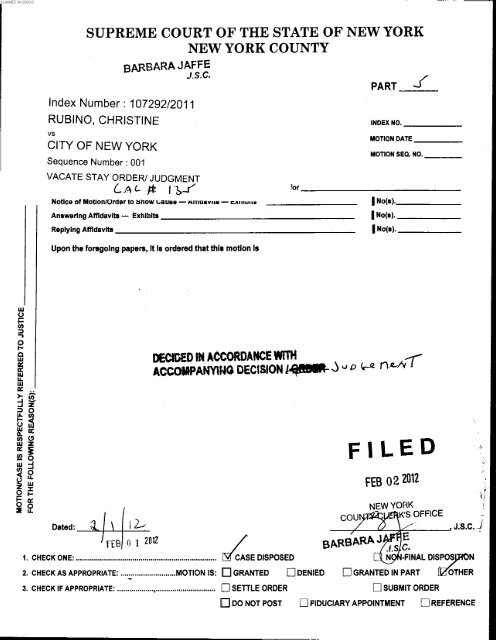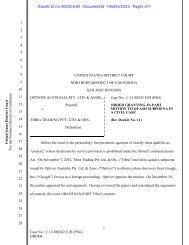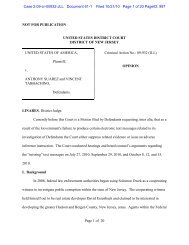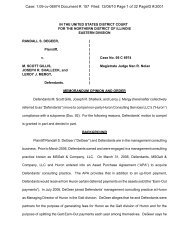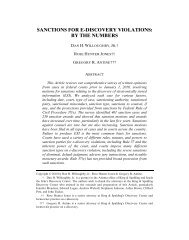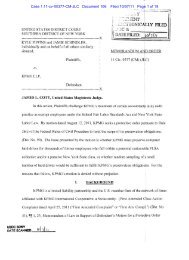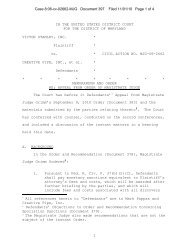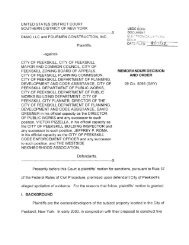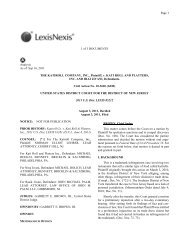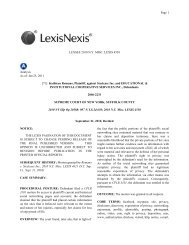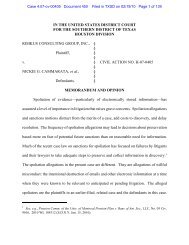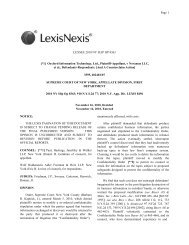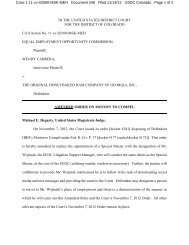vacated - E-Discovery Law Alert
vacated - E-Discovery Law Alert
vacated - E-Discovery Law Alert
- No tags were found...
You also want an ePaper? Increase the reach of your titles
YUMPU automatically turns print PDFs into web optimized ePapers that Google loves.
NNED ON 21212012<br />
...... -<br />
SUPREME COURT OF THE STATE OF NEW YORK<br />
NEW YORK COUNTY<br />
BARBARA JAFFE<br />
J.S.C.<br />
Index Number : 107292/2011<br />
RUBINO, CHRISTINE<br />
vs<br />
CITY OF NEW YORK<br />
Sequence Number : 001<br />
VACATE STAY ORDER/ JUDGMENT<br />
LA&# 1.u<br />
Notlce of Motlonlorder to snow Lause - A~~ICID~VILU<br />
Answerlng AffldavlG - Exhibits<br />
Roplylng Affldavib<br />
- cAiiiuIm<br />
Upon the fomgolng paper$, It 18 ordered that thlt motlon Is<br />
ior<br />
PART J/<br />
INDEX NO.<br />
MOTION DATE<br />
MOTION 8EP. NO.<br />
I No(*).<br />
I Ndd.<br />
I No(*).<br />
FILED<br />
Y<br />
Dated:<br />
FEB 02 2012<br />
C;uTOFFICE<br />
NEW YORK , - I<br />
x,,/ \ 1 L<br />
J.S.C. 4<br />
FEB 0 1 zor2<br />
BA~BAM~ ,f*S c*<br />
..................................................................... -FINAL DISPOSPN<br />
-<br />
I. CHECK ONE: CASE DISPOSED<br />
2. CHECK AS APPROPRIATE: ........................... MOTION IS: GRANTED CI DENIED CI GRANTED IN PART Q~THER<br />
3. CHECK IF APPROPRIATE: ................................................. 0 SEllLE ORDER<br />
0 SUBMIT ORDER<br />
DO NOT POST 0 FIDUCIARY APPOINTMENT 0 REFERENCE<br />
2'
Index No. 107292/11<br />
For a Judgment pursuant to Article 75<br />
of the Civil Practice <strong>Law</strong> and Rules<br />
Petitioner,<br />
Argued: 11/1/11<br />
Motion Seq. No.: 00 1<br />
Motion Cal. No.: 135<br />
DECISION & .JUDGMENT<br />
-against-<br />
CITY OF NEW YORK; NEW YORK CITY<br />
DEPARTMENT OF EDUCATION; DENNIS<br />
WALCOTT, CHANCELLOR of NEW YORK CITY<br />
DEPARTMENT OF EDUCATION,<br />
FILED<br />
EB 02 2012<br />
NEW YORK<br />
COUNTY CLERK'S OFFICE<br />
For petitioner:<br />
Bryan D. Glass, Esq.<br />
Glass Krakower LLP<br />
11 Perm Plaza<br />
New York, NY 1000 1<br />
2 12-537-6859<br />
For respondents:<br />
Adam E. Collyer, ACC<br />
Michael A. Cardozo<br />
Corporation Counsel<br />
100 Church Street<br />
New York, NY 10007<br />
2 12-708-8688<br />
By notice of petition dated June 22,2011, petitioner brings this Article 75 proceeding<br />
seeking an order vacating the hearing officer's opinion and award in the disciplinary proceeding<br />
brought against her. Respondents oppose, and by notice of cross motion dated August 24,2011,<br />
move pursuant to Education <strong>Law</strong> 5 3020-a and CPLR 404(a), 321 l(a)(7), and 75 11 for an order<br />
dismissing the petition. For the following reasons, the petition is granted to the extent indicated<br />
and the cross motion is denied.<br />
L RACKGROW<br />
In 1995, petitioner, a tenured teacher, began working for respondent New York City
Department of Education (DOE). (Pet.). In February of 1997, she began working at Public<br />
School (P.S.) 203 in Brooklyn. (Petitioner’s Appendix [Pet. Appx.]).<br />
On June 22,2010, a New York City public school student fatally drowned during a field<br />
trip to the beach. (Id). On June 23,2010, after the school day was over and petitioner was at<br />
home, she posted the following on her Facebook page: “After today, I am thinking the beach<br />
sounds like a wonderfd idea for my 5* graders! I HATE THEIR GUTS! They are the devils<br />
(sic) spawn!” One of her Facebook friends then posted, “oh you would let little Kwame float<br />
away!’’ to which petitioner responded, “Yes, I wld (sic) not throw a life jacket in for a million!!”<br />
(Id).<br />
After viewing petitioner’s postings, one of petitioner’s Facebook friends, a P.S. 203<br />
colleague, contacted the school’s assistant principal and expressed concern about the propriety of<br />
the postings. (Id.). On June 24,2010, the assistant principal showed the postings to the principal,<br />
and upon her instruction, contacted the Special Commissioner of Investigation for the New York<br />
City School District (XI), which initiated an investigation. (Id,),<br />
Sometime before November 15,2010, the SCI investigator assigned to the matter issued<br />
his final report, observing, inter alia, that petitioner’s Facebook account is linked to her e-mail<br />
address and that he had viewed the postings on her page. (Id). On November 15,2010, SCI<br />
issued its final report adopting the investigator’s findings and recommending that petitioner be<br />
terminated. (Id.).<br />
On November 23,2010, the principal presented petitioner with SCI’s final report. (Id,).<br />
Petitioner responded that she did not remember the postings and that a fiiend, whom she named,<br />
had access to her Facebook account. (Id.). Shortly thereafter, at the principal’s request, petitioner
provided her with the friend’s contact information which the principal forwarded to SCI. SCI<br />
then re-opened its investigation. (Id).<br />
On December 14,201 0, the principal met with petitioner to discuss an allegation leveled<br />
against her of corporal punishment. (Id.). The Facebook incident was not discussed. (Id.).<br />
On December 15,2010, the SCI investigator interviewed petitioner’s friend who initially<br />
admitted responsibility for the postings. (Id.). However, when the investigator expressed<br />
disbelief and warned that she could be incarcerated for perjury, petitioner’s friend recanted,<br />
stating that petitioner had asked her to take responsibility for the postings so that she would not<br />
lose her job. (Id.). On December 16,2010, the investigator issued a new report wherein he<br />
summarized that interview, and on January 7,201 1 , SCI issued a revised final report adopting his<br />
findings and again recommending petitioner’s termination. (Id.).<br />
Sometime shortly thereafter, DOE charged petitioner with, inter alia, “misconduct,<br />
neglect of duty and conduct unbecoming her profession,” specifying, in pertinent part, as follows:<br />
Specifica~on 1: On or about June 23,2010, Lpetitioner] posted and/or disseminated<br />
comments on her Facebookcom webpage stating, “after today, I’m thinking the beach<br />
sounds like a wonderhl idea for my 5* graders! I €€ATE THEIR GUTS! They are all the<br />
devils (sic) spawn!”<br />
becification 3 : On or about June 23 , 20 10, Lpetitioner] received a response to her<br />
previous comment described in Specification 1 from an individual with the<br />
Fuceboak.com screen name Scott J. Levine stating, “oh you would let little Kwame float<br />
away!” and [petitioner] posted andor disseminated a subsequent message stating, “Yes, I<br />
wld (sic) not throw a life jacket in for a million!!”<br />
Specification 4: On or about and between November 2010 and December 2010,<br />
Lpetitioner] interfered with an oficial investigation of The Special Commissioner of<br />
Investigation for the New York City School District by directing her friend, Joanne Engel,<br />
to provide false information to investigators by claiming to have written the comments on<br />
[petitioner’s] Faceb~ok.com webpage as detailed in Specifications 1 & 3, so that<br />
[petitioner] would not get in trouble.<br />
3-
(Pet., Exh. A),<br />
On February 16,2011, a pre-hearing conference was held, and on February 28, March 2,<br />
3, 8, 10, 14, and 25, April 4, 6, 7, 11, and 27,201 1, hearings were held at which petitioner, her<br />
friend, and others testified. (Id,). An audio recording and transcript of petitioner’s friend’s<br />
interview were admitted in evidence. (Id.).<br />
Petitioner admitted to posting the comments in issue on Facebook, explaining that she did<br />
so after a hard day at work and removed them from her page three days later. She apologized for<br />
the postings, stating, “I’m sorry for it. I definitely chose the wrong forum to vent . . . , I’m sorry<br />
people took it as offensive, and if I could take it back, I certainly would, but I did take it down,<br />
when I realized it wasn’t just how I felt anymore.” (Id). She also testified that the incident has<br />
changed her Facebook use, as she only uses it now to keep in touch with “very close friends [and]<br />
..<br />
very close family members,” and she no longer expresses her opinions on her page. (Id). She<br />
claimed that she first realized the posted comments were problematic during her November 23,<br />
2010 meeting with the principal, that she could not remember during the meeting whether she<br />
had posted them, that she provided the principal with her friend’s contact information because<br />
her friend used her Facebook account, and that she discussed the posted comments with her<br />
friend in order to determine who had posted them. (Id). She remembered that she had posted the<br />
comments sometime between the November 23 and December 14 meetings but declined to<br />
inform the principal of same, that her fiiend did not immediately tell her about her interview, and<br />
that when she did, she did not admit to telling the investigator that petitioner had asked to her lie.<br />
(Id..). She repeatedly denied having asked her friend to take responsibility for the postings. (Id.).<br />
Petitioner’s friend testified that the first time she became aware of the Facebook postings<br />
4
was in late November 2010 when petitioner told her that the principal had approached her about<br />
them, that petitioner initially did not recall making them, and that petitioner told her she had<br />
given the principal her contact information. (Id.). She also denied having posted the comments<br />
or that petitioner had asked her to lie about doing so, explaining that she had told the investigator<br />
that she posted the comments in an effort to help a friend, that she subsequently recanted because<br />
he told her she would go to jail if she perjured herself, and that she then told him that petitioner<br />
had asked her to lie because she was nervous. (Id). And, according to her, she called petitioner<br />
the day of the interview to tell her that she had tried to take responsibility for the postings but<br />
disclosed neither that she told the investigator petitioner had asked her to lie nor that the<br />
interview was taped. (Id).<br />
On June 6,2011, the hearkg officer issued a 52-page opinion and award, sustaining<br />
specifications 1 , 3, and 4, and recommending termination of petitioner’s employment. (Pet.,<br />
Exh. A).<br />
As petitioner admitted to posting the comments on Facebook, the hearing officer<br />
sustained specifications 1 and 3, emphasizing that petitioner had engaged in conduct unbecoming<br />
a teacher in posting offensive comments in a forum that is not truly private. (Id.). She noted that<br />
neither petitioner’s removal of the postings nor her superior’s failure to instruct her to do so<br />
altered the severity of the offense, as petitioner had already created an %lectronic footprint”<br />
insofar as her postings were copied and disseminated. (Id.).<br />
The hearing officer also discredited petitioner’s denial of having asked her friend to take<br />
responsibility for the postings and her claim that she did not think to notify the principal once she<br />
remembered having posted the comments. (Id.). She also determined that if it were true that<br />
5
petitioner’s friend had decided, by herself, to take responsibility for the postings, she “could<br />
easily have maintained at least that part of her story and maintained her part in the entire failed<br />
enterprise without ever blaming [petitioner],” and that her friend’s tone during the interview does<br />
not reflect having been pressured into implicating petitioner. (Id.). Concluding that petitioner<br />
had “attempted to obstruct the investigation by continuously denying knowledge of the<br />
comments and by pointing to [ ] Engel as the likely or possible source,” the hearing officer<br />
sustained specification 4. (Id,)).<br />
The hearing officer declined to “render a conclusive decision on the [first amendment]<br />
rights of a person making inappropriate comments on Facebook,” but determined that, having<br />
referred to her students in her postings, petitioner was acting as a teacher, not as a private<br />
citizen, and that while the drowning itself may have been a matter of public concern, the postings<br />
were not. (Id.).<br />
In deeming termination the appropriate penalty for petitioner’s misconduct, the hearing<br />
officer emphasized the public nature of online postings and noted that petitioner had breached<br />
DOE’S trust by conspiring with her fiend such that “it is impossible for her employment to be<br />
continued” and that teachers should instill in their students the importance of taking<br />
responsibility for their actions. (Id,). She also found that petitioner did not apologize for doing<br />
so and only apologized “begrudgingly” for the postings. (Id.).<br />
II. CONTENT IONS<br />
Petitioner asserts that the hearing officer’s decision and award is arbitrary and capricious<br />
and that her termination is shocking to one’s sense of fairness, as she had a 15-year unblemished<br />
employment history with respondent, her offense bears no relation to her teaching ability, and the<br />
6
hearing oecer impermissibly focused on her alleged lack of remorse. (Id). She also contends<br />
that her termination infringed on her first amendment right to free speech, as her statement<br />
pertained to a matter of public concern, and she made it in her capacity as a private citizen. (Id.),<br />
In opposition, and in support of their cross motion, respondents deny that the hearing<br />
officer’s opinion and award is arbitrary and capricious, as she considered each specification<br />
separately and explained her decision by citing to the record. They argue that petitioner’s<br />
termination is proportionate to her offense, as the hearing offcer was entitled to consider her lack<br />
of remorse. (Resps.’ Mem. of <strong>Law</strong>). They also contend that petitioner was speaking in her<br />
official capacity as a teacher in posting her comments on Facebook, and thus, that her<br />
termination does not violate her first amendment rights. (Id.).<br />
In reply, Ad in opposition to respondents’ cross-motion, petitioner maintains that the<br />
penalty of termination is disproportionate to the severity of her offense, as she made the<br />
statement to a small, private, adults-only audience, and the hearing oficer disregarded her<br />
apology for her actions. (Affirmation of Bryan D. Olass, Esq., in Opposition, dated Sept. 16,<br />
20 1 1).<br />
In reply, and in sur-reply, respondents maintain that petitioner’s termination is an<br />
appropriate penalty, emphasizing that she was also found guilty of conspiring to mislead the SCI<br />
investigator and that Facebook is a public forum insofar as anything posted on it may be copied<br />
and publically disseminated. (Affirmation of Adam E. Collyer, ACC, in Reply, dated Sept. 28,<br />
20 1 1).<br />
PI. ANALym<br />
A, Applicable law<br />
When a hearing is held pursuant to Education <strong>Law</strong> 4 3020-a, a party who was subject to<br />
-<br />
7
the hearing may apply to vacate the hearing officer’s opinion and award on the grounds that her<br />
rights were prejudiced by:<br />
(I) corruption, fraud or misconduct in procuring the award;<br />
(ii) partiality of an arbitrator appointed as a neutral, except where the award was by<br />
confession;<br />
(iii) an arbitrator, or agency or person making the award exceeded his power or so<br />
imperfectly executed it that a final and definite award upon the subject matter was not<br />
made; or<br />
(iv) failure to follow the procedures of this article.<br />
(CPLR 75 1 1 PI[ 11).<br />
In reviewing such an award, the court must also determine whether it was rendered “in<br />
accord with due process and [was] supported by adequate evidence,” and whether it satisfies the<br />
arbitrary and capricious standard of Article 78. (Lackow v Dept. of Educ. [or ‘‘Board’’I of the<br />
City of N. I:, 5 1 AD3d 563,567 [ 1 It Dept 2008 1). The party chdlenging the arbitration award<br />
bears the burden of proving that it is invalid (id), and if the motion to vacate is denied, the court<br />
must confm the award (CPLR 751 1 [e]).<br />
B. e titioner’s first mq&pen t claim<br />
As errors of fact or law provide no basis for vacating an award (Mutter ofNew York State<br />
Correctional OfJicers & Police Benevolent Assoc., Inc. v State of New York, 94 NY2d 321<br />
[ 1999]), and as the hearing officer determined that the Facebook postings do not constitute<br />
protected speech insofar as she decided that petitioner posted the comments as a teacher and that<br />
the comments did not pertain to a matter of public concern, I do not address the merits of<br />
petitioner’s first amendment claim.<br />
And, even if petitioner’s first amendment claim are construed an allegation that the<br />
hearing oficer exceeded her authority in rendering an award that violates public policy (CPLR<br />
8
75 1 1 [b] [ 13 [iii]), the limited scope of review nonetheless precludes an analysis of the merits of<br />
her claim (see Matter of New York State Correctional Oficers, 94 NY2d at 329 [where arbitrator<br />
made determination implicating petitioner’s first amendment rights, and respondent claimed<br />
award violates public policy, court declined to analyze merits of claim ‘LUnder [ ] guise of public<br />
policy,” as doing so would “invade [ 3 province of [ ] arbitrator”]).<br />
As petitioner alleges neither that her rights were prejudiced by any of the other<br />
circumstances set forth in CPLR 75 1 1 (b)( 1) nor that her due process rights were violated, I need<br />
only determine whether the award is arbitrary or capricious.<br />
C. Arbitraw and cam ‘cious<br />
In reviewing an administrative agency’s determination as to whether it is arbitrary and<br />
. capricious under CPLR Article 78, the test is whether the determination “is without sound basis<br />
in reason and . . . without regard to the facts.” (Matter of Pel1 v Bd. of Educ. of Union Free<br />
School Dist. No. 1 of Towns of Scarsdale & Mamaroneck Westchester County, 34 NY2d 222,<br />
23 1 [1974]; Matter of Kenton Assoc. v Div. of Hous. & Community Renewal, 225 AD2d 349 [lSt<br />
Dept 19961). Moreover, the determination of an administrative agency, “acting pursuant to its<br />
authority and within the orbit of its expertise, is entitled to deference, and even if different<br />
conclusions could be reached ELS a result of conflicting evidence, a court may not substitute its<br />
judgment for that of the agency when the agency’s determination is supported by the record.”<br />
(Matter of Partnership 92 LP & Bldg, Mgt. Co., Inc. v State of N. Y. Div. of Hous. & Community<br />
Renewal, 46 AD3d 425,429 [lnt Dept 20071, afd 11 NY3d 859 [2008]). And, a hearing officer’s<br />
credibility determinations are “largely unreviewable because the hearing oficer observed the<br />
witnesses and was able to perceive . . . all the nuances of speech and manner that combine to<br />
9
form an impression of either candor or deception.” (Matter of Berenhaus v Wurd, 70 NY2d 436,<br />
443 [ 19871; Lackow, 5 1 AD3d at 569).<br />
Here, given petitioner’s admission to posting the subject comments on her Facebook<br />
page, the hearing officer’s determinations as to specifications 1 and 3 are neither arbitrary nor<br />
capricious. And, although both petitioner and her friend denied that petitioner asked her to take<br />
responsibility for the postings, the hearing officer discredited the friend’s explanation of why she<br />
implicated petitioner during her interview. She also discredited petitioner’s explanation of why<br />
she failed to notify the principal that she had posted the comments. Absent a sufficient basis for<br />
disturbing these credibility determinations, the hearing officer’s determination as to specification<br />
4 is neither arbitrary nor capricious.<br />
p. Propoitionaliw of ~qn&y<br />
The standard for reviewing a penalty imposed after a hearing held pursuant to Education<br />
<strong>Law</strong> 5 3020-a is whether the punishment imposed “is so disproportionate to the offense, in the<br />
light of all the circumstances, as to be shocking to one’s sense of fairness.” (Matter of Pell, 34<br />
NY2d at 233). A result is shocking to one’s sense of fairness when:<br />
(Id. at 234).<br />
the sanction imposed is so grave in its impact on the individual subjected to it that it is<br />
disproportionate to the misconduct . . . of the individual, or to the harm or risk of harm to<br />
the agency or institution, or to the public generally visited or threatened by the<br />
derelictions of the individuals. Additional factors would be the prospect of deterrence of<br />
the individual or of others in like situations, and therefore a reasonable prospect of<br />
recurrence of derelictions by the individual or persons similarly employed. There is also<br />
the element that the sanctions reflect the standards of society to be applied to the offense<br />
involved.<br />
The penalty of termination has been held to shock one’s sense of fairness where the<br />
petitioner had a long and otherwise unblemished employment history. (See Matter of Riley v Ciy<br />
- 10
of New York, 84 AD3d 442 [ 1 st Dept 2011 J [where, “in the 15 years preceding the incident,<br />
petitioner had received not a single formal reproach”]; Matter of Diefenthaler v Klein, 27 AD3d<br />
347 [ 1 ‘ Dept 20061 [where misconduct was “an isolated error of judgment” and petitioner had<br />
more than 10 years of unblemished service]; Matter of Solis v Dept. of Educ. of the City of New<br />
York, 30 AD3d 532 [2d Dept 20061 [where petitioner had 12 years of unblemished service];<br />
Mutter of Weinstein v Dept. of Educ. of the City of New Yo&, 19 AD3d 165 [ lm Dept 20051, Iv<br />
denied, 6 NY3d 706 [2006] [where petitioner had “30-year history of exemplary service in the<br />
teaching profession”]). Termination has also been considered disproportionate to offenses that<br />
cause no injury. (See Mutter of Riley, 84 AD3d 442 [student admitted to sustaining no emotional<br />
or physical injury]; Matter of Patterson v City of New York, 2011 NY Slip Op 30870p] [Sup Ct,<br />
New York County Apr. 11 , 20113 [offense did not affect petitioner’s teaching ability]). -<br />
Here, petitioner’s 15-year employment history with the DOE was unblemished before<br />
she posted the offensive comments, and she posted them outside the school building and after<br />
school hours. Moreover, there is no indication in the record, nor any finding, that her postings<br />
affected her ability to teach. (Cf Land v 1; ’Anse Creuse Public School Bd. of Educ., 2010 WL<br />
2135356 wich App May 27,2010], Zv denied 488 Mich 913,789 NW2d 458 [2010] [where<br />
petitioner terminated after photographs of her engaging in lewd behavior at bachelorette party<br />
were posted on internet, termination <strong>vacated</strong> on ground that her behavior was legal and occurred<br />
outside school context, did not impact her ability to teach, and thus did not constitute<br />
~nisconduct]).<br />
There is also no evidence that her postipgs injured her students or that she intended any<br />
injury. Although the hearing officer emphasized the public nature of her postings and her
creation of an “electronic footprint,” she made no finding as to their effect on petitioner’s past<br />
and future students. And, the specter of racism emerging from the postings did not originate with<br />
petitioner, and there is no indication in the record apart from the posting that she is intolerant or<br />
that the feeling she expressed, made after a hard day at work, affects the manner in which she<br />
teaches and treats her students.<br />
While I do not address the hearing officer’s determination as to the alleged violation of<br />
petitioner’s first amendment right to freedom of speech (see IILB., supra), in these<br />
circumstances, termination of petitioner’s employment is inconsistent with the spirit of the first<br />
amendment. Facebook has rapidly evolved from a platform used solely by American college<br />
students to a world-wide social and professional network. It is commonly used to advertise<br />
businesses, organize parties; debate politics, and air one’s grievances, among myriad other uses.<br />
(See generally Sengupta and Rusli, Personal Data’s Value Facebook Set to Find Out, New<br />
York Times, Feb. 1,2012, section A, col0). Indeed, with Facebook, as with social media in<br />
general, one may express oneself as freely and rapidly as when conversing on the telephone with<br />
a friend. Thus, even though petitioner should have known that her postings could become public<br />
more easily than if she had uttered them during a telephone call or over dinner, given the illusion<br />
that Facebook postings reach only Facebook fiiends and the fleeting nature of social media, her<br />
expectation that only her friends, all of whom are adults, would see the postings is not only<br />
apparent, but reasonable. While her reference to a child’s death is repulsive, there is no evidence<br />
that her postings are part of a pattern of conduct or anything other than an isolated incident of<br />
intemperance.<br />
Moreover, there is no reason to believe that petitioner will again post inappropriate or
offensive comments online, as she repeatedly apologized during the administrative hearing for<br />
the posts, and expressed tearful remorse at oral argument before me. Although she was found to<br />
have violated DOE’S trust by interfering with the investigation, petitioner denies having done so<br />
and thus cannot be expected to express remorse for it, (See Mutter of Patterson, 201 1 NY Slip<br />
Op 3087O[U] [as petitioner denied intentionally engaging in wrongdoing, she could not be<br />
expected to express remorse for doing so]). In any event, her clumsy attempt at a coverup<br />
reflects panic, not planning.<br />
And, while students must learn to take responsibility for their actions, they should also<br />
know that sometimes there are second chances and that compassion is a quality rightly valued in<br />
our society. Ending petitioner’s long-term employment on the basis of a single isolated lapse of<br />
judgment teaches otherwise. While I do not condone petitioner’s conduc2 ind acknowledge that<br />
teachers should act as role models for their students, termination in these circumstances does not<br />
correspond with the measure of compassion a teacher should show her students. Rather, it places<br />
far too great a strain on the right to express oneself freely among friends, notwithstanding the<br />
repulsiveness of that expression. (Cf Hurley v Irish-American Gay, Lesbian and Bisexual Group<br />
ofBoston, Inc., 515 US 557,574 [1995][“the point of all speech protection . , . is to shield just<br />
those choices of content that in someone’s eyes are misguided, or even hurtful.”]; Texas v<br />
Johnson, 491 US 397,414[1989] [(‘If there is a bedrock principle underlying the First<br />
Amendment, it is that the government may not prohibit the expression of an idea simply because<br />
society finds the idea itself offensive or disagreeable.”]).<br />
For all of these reasons, petitioner’s termination is so disproportionate to her offense as to<br />
shock one’s sense of fairness. The petition is therefore granted to the extent that petitioner’s<br />
13<br />
-
termination is <strong>vacated</strong>, and the matter is remanded to DOE for the imposition of a lesser penalty<br />
in accordance with this decision.<br />
IV. c ONCLUS ION<br />
Accordingly, it is hereby<br />
ORDERED, that the petition is granted to the extent that petitioner’s termination is<br />
<strong>vacated</strong>, and the matter is remanded to respondent New York City Department of Education for<br />
the imposition of lesser penalty in accordance with this decision; and it is further<br />
ORDERED, that respondents’ cross motion to dismiss the petition is denied.<br />
ENTER:<br />
FILED<br />
DATED: February 1,2012<br />
New York, New York<br />
J. S. c.<br />
NEW YORK<br />
COUNTY CLERK‘S OFFICE<br />
14


